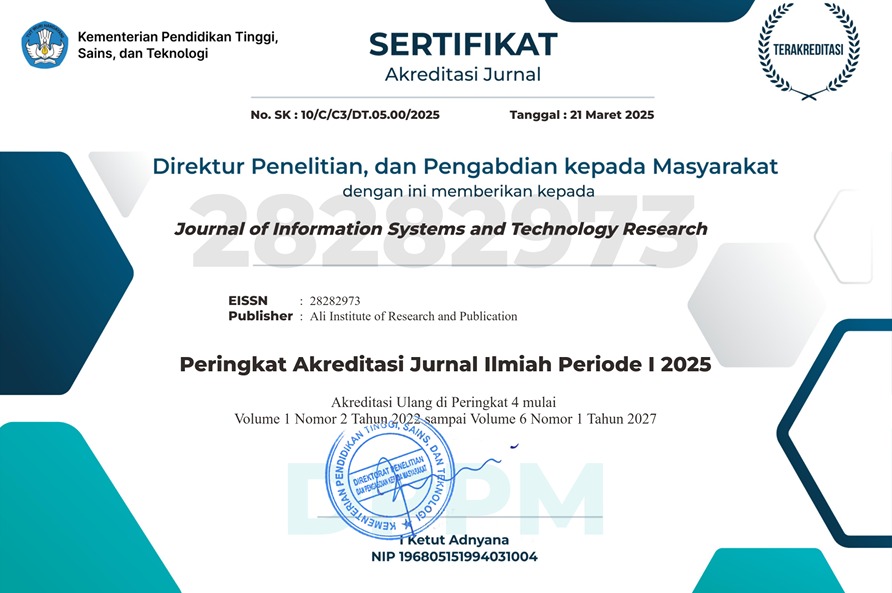Implementation of the Kano Model and Importance and Performance Analysis in the Development of a Web-Based Knowledge Management System
DOI:
https://doi.org/10.55537/jistr.v2i1.552Keywords:
Kano model, Knowledge Management, Knowledge gap, Importance and performance analysisAbstract
The student department is a work unit that oversees, accommodates and handles various kinds of student activities, both academic and non-academic. The problem that is usually faced by the student department is the occurrence of a knowledge gap (k-gap) between old and new office holders. This problem is caused by the frequent rotation of positions in university departments, while this position rotation is not followed by holding knowledge sharing sessions between employees. The purpose of this research is to develop a web-based knowledge management system for student departments that can overcome the knowledge gap problem. The method used in this research is the Importance and Performance Analysis (IPA) and the Kano Model. The reason for choosing the IPA method is because IPA can be used to measure the value of respondents' mastery of research attributes and can also measure the importance value of an attribute based on the respondent's perception. The Kano model is used in this study because Kano can categorize the attributes of a product or service based on how well the product/service is able to satisfy customer needs. The result of this study is a student department knowledge management system which can reduce the value of the knowledge gap by 1.63 points.
Downloads
References
A. Etty and E. Setyorini, “Availability of Agricultural Technology Information Source at Several Districts in Java,” J. Perpust. Pertan., vol. 21, no. 1, pp. 30–35, 2012.
M. Qowimuddinzuhri, “Peran UKM Kerohanian, Pendidikan Islam,” pp. 10–54, 2013.
P. Lumbantobing, Knowledge Management: Manajemen Knowledge Sharing. 2012.
I. Kaniawulan et al., “Sistem Manajemen Pengetahuan Forum Diskusi Dosen Knowledge Management System of Lecturer Discussion Forum,” J. Teknol. Inf. dan Ilmu Komput., vol. 7, no. 1, pp. 51–58, 2020, doi: 10.25126/jtiik.202071258.
W. Abas, “Analisa Kepuasan Mahasiswa Terhadap Website Universitas Negeri Yogyakarta (Uny),” Manajemen, pp. 1–6, 2013.
A. D. Linggan, “Penambahan Pelanggan IndiHome 2018,” e-Proceeding Eng. Telkom Univ., vol. 6, no. 2, pp. 6548–6555, 2019.
E. Zuraidah, “Knowledge Management System Untuk SDM Menggunakan Seci Model (Studi Kasus: Koperasi Karyawan),” J. Inform., vol. 5, no. 1, pp. 157–168, 2018, doi: 10.31311/ji.v5i1.2481.
Bibit Satriono, A. Profita, and F. D. Sitania, “Perancangan dan Pengukuran Kinerja Perusahaan Berbasis Kerangka Agri-Food Supply Chain,” J. INTECH Tek. Ind. Univ. Serang Raya, vol. 6, no. 2, pp. 123–131, 2020, doi: 10.30656/intech.v6i2.2405.
S. Aslamiyah and A. Agustina, “Pengukuran Kesenjangan Pengetahuan (K-Gap) Menggunakan Importance and Performance Analysis dan Root Cause Analysis,” STRING (Satuan Tulisan Ris. dan Inov. Teknol., vol. 6, no. 1, p. 82, 2021, doi: 10.30998/string.v6i1.9933.
D. I. S. R. Nurcahyo, “Knowledge Management System dengan SECI Model Sebagai Media Knowledge Sharing Pada Proses Pengembangan Perangkat Lunak di Pusat Komputer Universitas Tarumanegara,” J. Teknol. Terpadu, vol. 5, no. 2, pp. 63–76, 2019.
N. Grataridarga, “Konsep Data, Information, Knowledge dan Wisdom (DIKW) Hierarchy pada Manajemen Kearsipan,” JIPI (Jurnal Ilmu Perpust. dan Informasi), vol. 4, no. 1, p. 117, 2019, doi: 10.30829/jipi.v4i1.4839.
Fransiska Ekobelawati, “Pengaruh Knowledge Management Terhadap Kinerja Karyawan,” J. Ekon. STIEP, vol. 3, no. 2, pp. 20–23, 2018, doi: 10.54526/jes.v3i2.4.
. M. H. I., . H. J., and . H. S., “Investigating the moderating role of knowledge: The relationship between auditor’s experience and ethical judgment,” Adv. Soc. Sci. Res. J., vol. 6, no. 2, pp. 491–503, 2019, doi: 10.14738/assrj.62.6193.
S. Alfarisi, “Sistem E - Learning Berbasis Knowledge Management Pada SMK Generasi Madani Cibinong,” vol. 7, no. 2, pp. 62–68, 2017.
E. Cahyaningsih, D. I. Sensuse, A. M. Arymurthy, and W. C. Wibowo, “NUSANTARA: A New Model of Knowledge Management in Government Human Capital Management,” Procedia Comput. Sci., vol. 124, pp. 61–68, 2017, doi: 10.1016/j.procs.2017.12.130.
S. Syaifullah, I. G. P. S. Wijaya, and A. Y. Husodo, “Satisfaction Information System of Academic Administration Services Based on IPA (Importance Performance Analysis) Study Case in Faculty of Engineering, Mataram University,” J. Comput. Sci. Informatics Eng., vol. 2, no. 1, pp. 37–43, 2018, doi: 10.29303/jcosine.v2i1.50.
P. Gupta and R. K. Srivastava, “Integrating SERVQUAL and Kano Model into QFD for Customer Satisfaction of the Hotel Service Industry,” no. January, 2012.
A. Susanto, “Implementasi Knowledge Management System Teknisi Politype Menggunakan Metode SECI dan KANO: Studi Kasus PT Bumimulia Plastic Industri,” Universitas Budi Luhur, 2017.
S. Aslamiyah, S. Anisah, E. Yulianto, and K. Widyantoro, “The Knowledge Management System ( KMS ) to Reduce Knowledge Gap at STMIK Widuri Student Unit,” 2019. [Online]. Available: https://search.proquest.com/openview/b7d16f1fca016222c6b111d310c247fb/1?pq-origsite=gscholar&cbl=2028729%0Ahttp://www.ijascse.org/ijascse-volume-8-theme-based-issue-9.
H. Setiarso, Bambang. Harjanto, Nazir Triyono. Subagyo, Penerapan Knowledge Management pada Organisasi, vol. 53, no. 9. 2013.
S. Taufik, Ahmad. Aslamiyah, “ANALISA NILAI KESENJANGAN PENGETAHUAN MENGGUNAKAN METODE IMPORTANCE AND PERFORMANCE ANALYSIS PADA MODEL TIWANA,” Jpurnal Inf. Technol. Comput. Sci., vol. 3, no. 2, pp. 260–269, 2020, doi: https://doi.org/10.31539/intecoms.v3i2.1735.
T. Hera and E. Elvandari, “Pengaruh Model Pembelajaran Explicit Instruction Pada Pembelajaran Tari Daerah Sebagai Dasar Keterampilan Menari Tradisi,” J. Sitakara, vol. 6, no. 1, p. 40, 2021, doi: 10.31851/sitakara.v6i1.5286.
Downloads
Published
How to Cite
Issue
Section
License
Copyright (c) 2023 Suwaebatul Aslamiyah, Motika Dian Anggraeni

This work is licensed under a Creative Commons Attribution-ShareAlike 4.0 International License.







